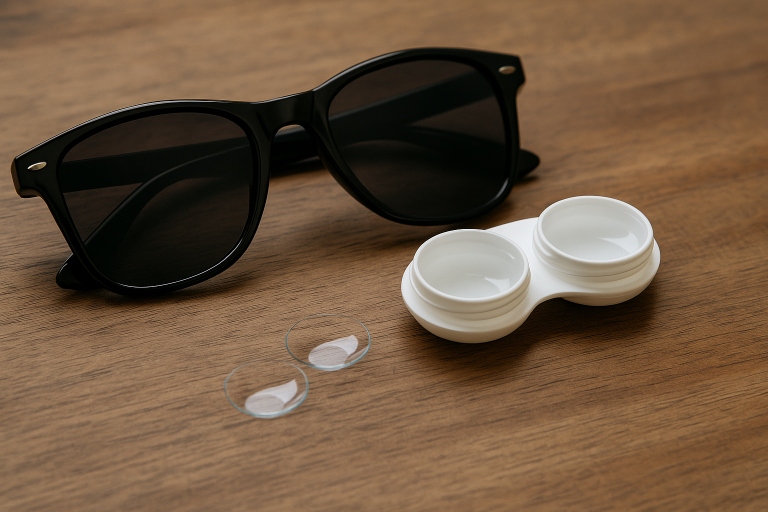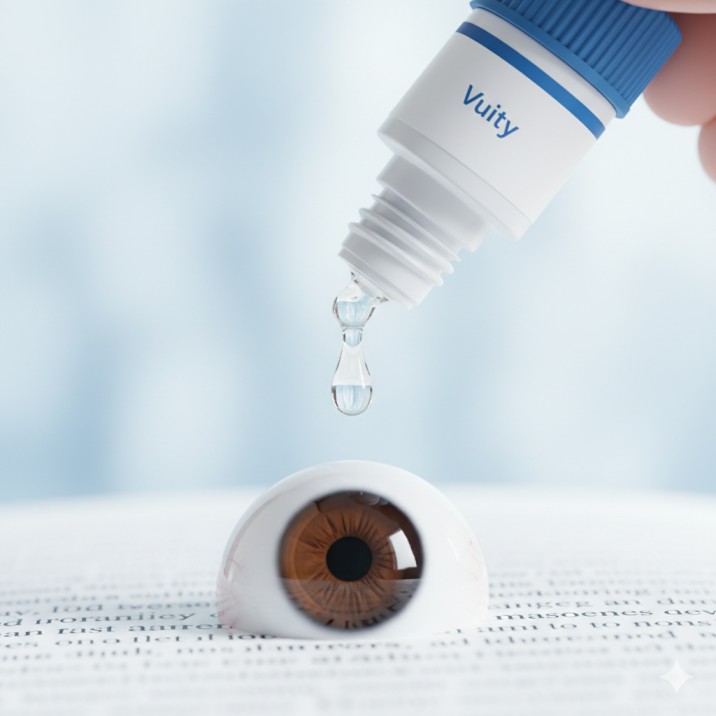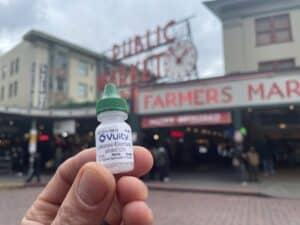Best Vision Options for Seattle: Sunglasses & Contacts
Key Takeaways: Vision Solutions Tailored for Seattle Lifestyles
-
Choose Based on Activity: Opt for prescription sunglasses for outdoor sports and UV protection, and soft contacts for high-motion, helmet-friendly activities.
-
Prioritize Eye Health: Prescription sunglasses offer built-in UV defense, while contact wearers must pair with quality sunglasses to prevent long-term damage.
-
Comfort vs. Convenience: Contacts provide all-day comfort and peripheral clarity, while sunglasses eliminate dryness and are better for wind or debris-heavy conditions.
-
Budget with Longevity in Mind: Contacts are more affordable upfront but require ongoing upkeep, whereas sunglasses involve a higher initial cost but last years with care.
-
Adapt to Seattle’s Climate: Use daily disposables during allergy seasons, and maintain proper hygiene and storage for both vision types to maximize performance and safety.
What Are Prescription Sunglasses? Vision Correction + Sun Protection
Prescription sunglasses merge precise vision correction with advanced sun protection. Unlike standard sunglasses, these medical-grade lenses are custom-crafted to your unique prescription while blocking 100% of harmful UVA/UVB rays—safeguarding long-term eye health.
Essential Features:
-
Full UV Defense: Blocks cataract and macular degeneration risks by filtering UVA/UVB radiation.
-
Glare-Reducing Polarization: Ideal for driving, watersports, and snow activities (reduces eye strain).
-
Personalized Prescription Accuracy: Tailored to your astigmatism, nearsightedness, or farsightedness.
-
Style-Forward Frames: Fashionable designs from classic to contemporary, with lens tint options.
-
Sports-Ready Durability: Impact-resistant materials (like polycarbonate) shield against debris.
Top 3 Benefits:
-
Eliminate lens-switching: Perfect vision outdoors without carrying multiple pairs.
-
All-in-one eye health: Combat glare + UV damage while correcting vision.
-
Crisp visual comfort: Reduce squinting and headaches in bright conditions.
Soft Contact Lenses: Freedom + Comfort for Active Seattle Lifestyles
Soft contact lenses are ultra-thin, flexible vision correctors that conform comfortably to your eye’s surface. Custom-fitted by Cannon EyeCare’s specialists, these medical devices come in precision-engineered variants to match unique vision needs across Seattle.
3 Primary Types Explained:
-
Daily Disposables: Hygienic single-use lenses – perfect for allergies, travel, or sensitive eyes.
-
Silicone Hydrogel: Advanced breathable material allowing 5x more oxygen flow for extended wear (up to 30 days).
-
Toric Lenses: Correct astigmatism with axis-specific stabilization technology.
Top Advantages for Seattle Wearers:
- Unrestricted Vision: No frame obstructions during sports, driving, or outdoor adventures.
- Active Lifestyle Ready: Stays secure during running, hiking, or watersports.
- Lightweight Comfort: Virtually undetectable all-day wear.
- Natural Aesthetics: No visible eyewear altering your appearance.
Prescription Sunglasses vs. Soft Contacts: Seattle’s Ultimate Vision Solution Guide
Choosing between prescription sunglasses and soft contacts? As Seattle’s premier eye care provider, Cannon EyeCare breaks down key differences for your active Pacific Northwest lifestyle:
1. Vision Correction & Protection:
-
Prescription Sunglasses: All-in-one solution combining custom vision correction with 100% UV blocking (essential for Seattle’s summer glare and mountain reflections).
-
Soft Contacts: Correct vision directly on the eye surface but require prescription sunglasses for UV defense during waterfront walks or drives across the I-90 bridge.
2. Comfort & Wearability:
-
Prescription Sunglasses: May feel bulky with bike helmets but offer zero eye dryness. Ideal for low-humidity days.
-
Soft Contacts: Feather-light and invisible – perfect for yoga or hiking – though pollen season may increase irritation risks.
3. Sports & Activity Performance:
-
Prescription Sunglasses: Dominant for impact protection (cycling, kayaking) + glare reduction on Puget Sound.
-
Soft Contacts: Unbeatable for peripheral vision in soccer, basketball, or rock climbing with no frame obstruction.
4. Cost & Maintenance:
-
Prescription Sunglasses: Higher initial investment ($200-$600) but last 2+ years with simple lens cleaning.
-
Soft Contacts: Lower startup cost ($50-$150) but require daily hygiene discipline + replacement fees (critical in Seattle’s damp climate).
5. Style & Convenience:
-
Prescription Sunglasses: Make a fashion statement at Pike Place Market with designer frames/tints.
-
Soft Contacts: Invisible aesthetic for dates or professional events – pair with non-RX sunglasses.
Prescription Sunglasses vs. Contacts: Best Picks for Seattle Sports
Active Seattleites need vision solutions matching our dynamic outdoors. Here’s how to choose:
Prescription Sunglasses Dominate For:
-
Impact Protection: Essential for cycling Burke-Gilman Trail, skiing at Snoqualmie, or kayaking Puget Sound.
-
Glare Combat: Polarized lenses cut water/snow reflection – critical for fishing Lake Washington or sailing Shilshole Bay.
-
All-Weather Shield: Guards against UV, wind, and debris during mountain biking or coastal hikes.
Soft Contacts Excel For:
-
High-Motion Activities: Running Green Lake, indoor climbing at SBP Seattle, or soccer at Starfire Sports.
-
Helmet/Goggle Compatibility: Unobstructed vision under ski helmets or swim goggles.
-
Natural Peripheral Vision: Vital for trail running in Discovery Park or paddleboarding Elliott Bay.
Costs, Care & Insurance: Smart Vision Investment for Seattle Lifestyles
At Cannon EyeCare, we help Seattle patients navigate expenses with clarity. Here’s your transparent comparison:
Prescription Sunglasses:
-
Upfront Cost: Higher investment ($200-$600) for premium polarized lenses and designer frames.
-
Durability: Last 2+ years with proper care – ideal for Seattle’s rainy winters and mountain adventures.
-
Insurance: Most WA plans cover $150-$300; we handle claims at our Capitol Hill clinic.
Soft Contacts:
-
Recurring Expenses: Lower start cost ($50 exam) but $20-$80/month for lenses + solutions.
-
Maintenance: Daily cleaning ritual essential (avoid infections during Seattle’s pollen season).
-
Insurance: Many plans include a $100-$200 annual allowance for supplies.
Choosing & Caring for Your Seattle Vision Gear: Pro Tips from Cannon EyeCare
Selecting and maintaining eyewear for Seattle’s dynamic lifestyle requires expert insight. Here’s your actionable guide:
How to Choose Your Perfect Match:
- Activity-Based Picks: Prescription sunglasses for mountain hikes/boating; contacts for gym sessions.
- Sensitivity Solutions: Allergic eyes? Daily disposables > reusable contacts. Light-sensitive? Polarized lenses.
- Style Alignment: Frames reflecting Seattle’s urban vibe vs. invisible contacts for professional settings.
Prescription Sunglasses Care: Extend Lifespan in PNW Climate
-
Daily Cleaning: Microfiber cloth + alcohol-free spray (prevent smudges from rain/humidity).
-
Safe Storage: Hard case when not worn – protects against coffee shop bag crushes or ferry rides.
-
Damage Checks: Monthly inspections for lens scratches (glare risks) or loose hinges (bring to our clinic!).
Soft Contacts Hygiene: Non-Negotiable Rules for Seattleites
- Pre-Handling Ritual: 20-second hand wash (critical during pollen season).
- Solution Protocol: Hydrogen peroxide-based cleaners kill Tacoma air pollutants.
- Replacement Discipline: Mark calendars! Dailies = discard nightly; monthlies = 30 days max.
- Sleep Rule: Never sleep in lenses (corneal ulcer risk spikes in dry winter air).
FAQs
-
What are the main differences between prescription sunglasses and soft contact lenses?
-
Prescription sunglasses correct vision and block UV rays with tinted lenses. Soft contacts correct vision directly on the eye but don’t provide UV protection.
-
-
Can I wear sunglasses over my soft contact lenses for sun protection?
-
How do I know if prescription sunglasses are better for my lifestyle than soft contacts?
-
Are soft contact lens prescriptions the same as glasses prescriptions?
-
How often should I replace my prescription sunglasses or soft contact lenses?
-
What are the risks of wearing soft contacts compared to prescription sunglasses?
-
Can insurance cover prescription sunglasses or contact lenses?
-
Why don’t soft contact lenses provide UV protection like prescription sunglasses?
-
Which is more comfortable for long-term wear: prescription sunglasses or soft contacts?
-
Can prescription sunglasses help reduce glare better than soft contacts?
-
Are there special contact lenses for people with astigmatism?
-
How do I properly care for soft contact lenses to avoid eye infections?

 Looking for the
Looking for the 

